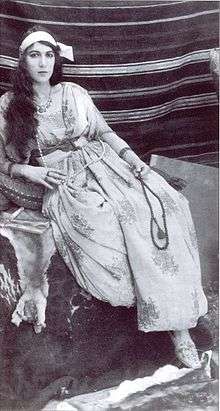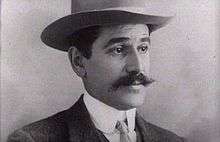Haydée Tamzali
Haydée Samama Chikly Tamzali (August 23, 1906 – August 20, 1998) was a Tunisian actress, writer, and filmmaker, considered the first woman screenwriter in Africa.

Early life
Haydée Chikly was born in 1906, the daughter of Tunisian Jewish filmmaker Albert Samama Chikly.[1] Her mother was Bianca Ferrero, an Italian-born woman from Savoy.[2] Tamzali's paternal grandfather, David Samama, was a banker of the Bey who established a banking institution that later become the Bank of Tunisia.[3]
Career

Haydée Chikly worked with her father from girlhood.[4] He directed her in her first starring role in a short film, Zohra (1922), written by her, and considered the first fiction film made in Tunisia. They followed this work with another silent drama in 1924, Ain el-Ghezal (The Girl from Carthage), also starring Haydée Chikly, in a story she wrote "to show how badly women were treated when they were just sold off with an arranged marriage into a man's world."[5] The younger Chikly also took a turn at film editing and hand-coloring in her father's employ.
Haydée Chikly also appeared in Rex Ingram's The Arab (1924), but her father did not permit her to relocate to Hollywood to pursue an acting career.[6][7]
In 1996, Haydée Tamzali appeared in the film A Summer in La Goulette, by Férid Boughedir.[8]
Private life
As an adult, Haydée Tamzali married, raised two children, converted to Islam,[9] lived in Algiers and Paris, and wrote a cookbook of North African cuisine, La Cuisine en Afrique du Nord.[10][11]
In 1929, Haydée married the Algerian Khellil Tamzali and became Haydée Chikly Tamzali. She left Tunisia for Algeria where she continued to write. She was active in the civil society, becoming President of Social Works, Secretary of the Red Cross, and President of the League Against Cancer. She wrote many short stories and articles for the Tunisian national newspaper La Presse, as well a book in 1992 composed of true stories about the past called Lost Images.[12]
References
- Luke McKernan, "Albert Samama Chikly" Who's Who of Victorian Cinema (revised July 2015).
- Giulia Echites, "Visionario Chikly, portò il cinema (e la bicicletta) agli africani" la Repubblica (July 11, 2015).
- "Haydée Chikly". Columbia University. Retrieved 2020-03-21.
- "Tunisian Jew Starts the First African Film Production" Wisconsin Jewish Chronicle (June 27, 1924): 1. via Newspapers.com

- Ouissal Mejri, "Tunisia" in Jill Nelmes and Jule Selbo, eds., Women Screenwriters: An International Guide (Palgrave Macmillan 2015). ISBN 978-1-137-31238-9
- Roy Armes, African Filmmaking: North and South of the Sahara (Indiana University Press 2006): 25. ISBN 978-0-253-34853-1
- Ruth Barton, Rex Ingram: Visionary Director of the Silent Screen (University Press of Kentucky 2014): 130. ISBN 978-0-8131-4711-6
- Lyn Julius, "Pining for La Goulette" Jewish Quarterly 199(Autumn 2005).
- Linda Badley and Steven Jay Schneider, Traditions in world cinema, éd. Edinburgh University Press, Édimbourg, 2006, p. 146 ISBN 9780748618637
- Haydée Tamzali, La Cuisine en Afrique du Nord (VILO 1999). ISBN 978-0-905500-54-6
- Grace Kirschenbaum, "Reading Food: Eating in Tongues" Los Angeles Times (November 8, 1990).
- "Profile of Haydée Chikly". Women Film Pioneers Project. Retrieved 2020-02-29.